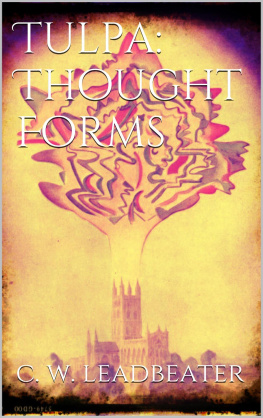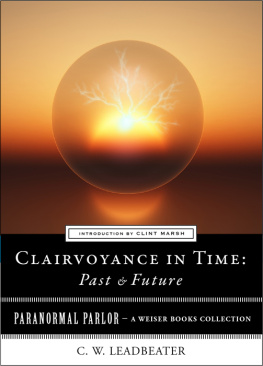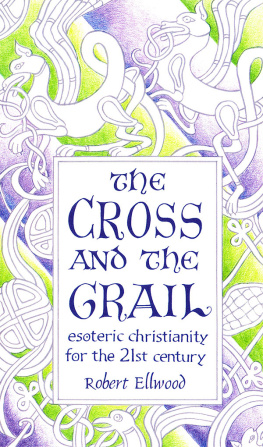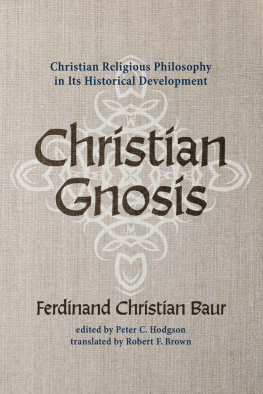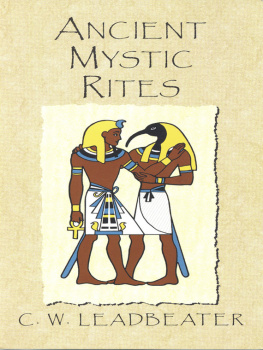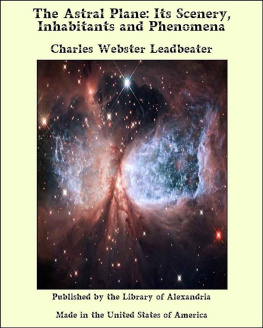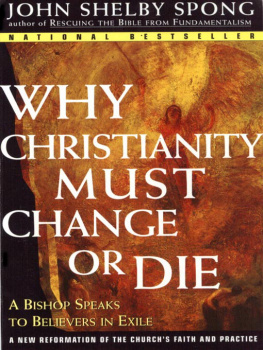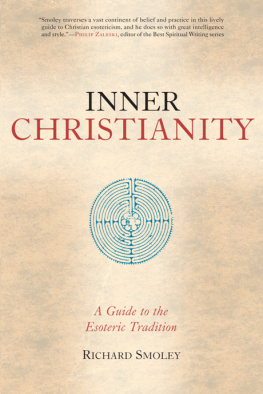
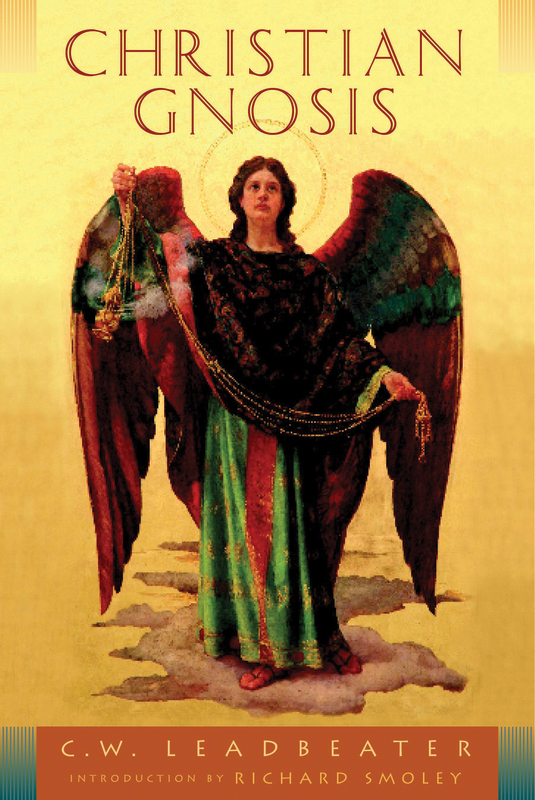
CHRISTIAN
GNOSIS
C HARLES W. L EADBEATER
E DITED WITH A FOREWORD BY
S TEN VON KRUSENSTIERNA
I NTRODUCTION AND NOTES BY
R ICHARD SMOLEY

Theosophical Publishing House
Wheaton, Illinois Chennai, India
Find more books like this at www.questbooks.net
Compilation copyright 2011 by St. Alban Press
First Quest Edition 2011
Quest Books
Theosophical Publishing House
P. O. Box 270
Wheaton, IL 60187-0270
Without limiting the rights under copyright reserved above, no part of this publication may be reproduced, stored in or introduced into a retrieval system, or transmitted, in any form, or by any means (electronic, mechanical, photocopying, recording, or otherwise), without the prior written permission of the publisher of this book.
The scanning, uploading, and distribution of this book via the Internet or via any other means without the permission of the publisher is illegal and punishable by law. Please purchase only authorized electronic editions, and do not participate in or encourage electronic piracy of copyrighted materials.
While the author has made every effort to provide accurate telephone numbers and Internet addresses at the time of publication, neither the publisher nor the author assumes any responsibility for errors or for changes that occur after publication. Further, the publisher does not have any control over and does not assume any responsibility for author or third-party websites or their content.
Cover design by Beth Hansen-Winter
Library of Congress Cataloging-in-Publication Data
Leadbeater, C. W. (Charles Webster), 18541934.
Christian gnosis / Charles W. Leadbeater; edited with a foreword by Sten von
Krusenstierna; introduction and notes by Richard Smoley.1st. Quest ed. 2011.
p. cm.
Includes bibliographical references.
ISBN 978-0-8356-0895-4
1. Liberal Catholic ChurchDoctrines. I. Von Krusenstierna, Sten. II. Smoley,
Richard. III. Title.
BX4795.L45L43 2011
ISBN for electronic edition, epub format: 978-0-8356-2053-6
5 4 3 2 1 * 11 12 13 14 15
CONTENTS
DIAGRAMS
INTRODUCTION TO THE SECOND EDITION
BY RICHARD SMOLEY
T oday the word gnosis provokes a cavalcade of associations. It can mean a kind of spiritual experience akin to enlightenment. It can refer to the ancient Christian mystical schools of the early centuries AD or even to a spate of new religious movements that lay claim to the ancient Gnostic heritage.
For Charles W. Leadbeater, whose essays constitute this volume, the meaning of gnosis is different. In ancient Christianity, he tells us, gnosis was a technical term. It did not mean ordinary wisdom, but the special religious teaching to those who are at the stage of the perfect (p. 88). He quotes the apostle Paul: We speak the wisdom of God in a mystery, even the hidden wisdom, which God ordained before the world unto our glory (1 Cor. 2:7). And he goes on to argueechoing the great Church Father Origenthat this hidden wisdom could not have been the teachings of exoteric Christianity, since these were widely known even to the ancient public.
It is this hidden wisdom that is the topic of this book. It would be foolish of me to spell out these ideas in an introduction, since Leadbeater himself does so clearly and at length, but as a preliminary it would be helpful to say something about these teachings and their context, as well as about the man who presents them.
Charles Webster Leadbeater was born in Stockport, England, in 1854 (some sources have given this date incorrectly as 1847). He started his career as a bank clerk, but, thanks to a vocation to the priesthood and help from an influential relative, he was able to pursue theological studies and was ordained as a priest in the Church of England in 1879. In 1883 he joined the Theosophical Society, which had been formed in 1875 with the partial object of exploring the hidden mysteries of nature and the latent powers in man.
One aspect of the Theosophical Society that especially appealed to Leadbeater was its claim that it had been founded under the inspiration of hidden Masters of Wisdom, individuals on earth who were possessed of certain extraordinary powers (such as clairvoyance and telekinesis) and who were in communication with the founders of the Society, notably H. P. Blavatsky and Henry Steel Olcott. Leadbeater wanted to be the disciple of such a Master and even wrote a letter to that effect, transmitted through a spirit guide in March 1884. In October of that year, he received a replya letter written in blue pencil and signed KHthe initials used by Koot Hoomi, one of the Masters. In it Koot Hoomi told him what was involved in the discipleship he sought. The letter also suggested that Leadbeater visit India for a few months.
At the time Leadbeater had no personal ties in England, so he resolved to go to India and stay there indefinitely. He arrived at the end of 1884. The following year he embarked upon a course of study (which he mentions occasionally in this collection) that enabled him to develop certain psychic faculties, notably clairvoyance. This faculty would inform much of his writing for the rest of his life.
Leadbeater became a close associate of Annie Besant, who had joined the Theosophical Society in 1889 and would become its leader in the following decade. Together with Besant, Leadbeater conducted inquiries into the psychic realms that led to such works as the 1895 collection Occult Chemistry, in which the authors described their visions of subatomic particles (objects that were still unknown to science, which still regarded the atom as an irreducible entity). Other works inspired by his research include The Astral Plane, Invisible Helpers, The Other Side of Death, Man Visible and Invisible, and The Chakras. These last two proved to be particularly influential, and to this day there are very few New Age books on the subtle bodies of man or the chakras that are not more or less directly influenced by Leadbeater.
In 1906, Leadbeater fell afoul of accusations of sexual impropriety with young boys. Evidently he hadvery much against the mores of the timeadvised them to masturbate. Whether he did anything more is rather hard to determine, but, in any event he left the Theosophical Society in 1906 and pursued his own occult researches for the next three years, until Annie Besant, at this point the president of the society, invited him to return. He did so and settled at the societys world headquarters at Adyar, near Madras (todays Chennai), India. In 1909 he took an interest in a young Brahmin boy, Jiddu Krishnamurti, foreseeing that he would display remarkable qualities. Besant agreed, predicting that Krishnamurti would serve as a vehicle for the new World Teacher who was destined to come and inaugurate a new cycle for humanity. Krishnamurti was taken up by Besant and Leadbeater and given the finest English education available at the time. The Theosophists even formed a society, the Order of the Star, to promote Krishnamurtis work as World Teacher.
The predictions for Krishnamurti did have some validity. He became one of the most influential spiritual teachers of the twentieth century but in the opposite way to what Besant and Leadbeater had expected. In 1929, in a famous speech, Truth Is a Pathless Land, he dissolved the Order of the Star. You can form other organizations and expect someone else, he told his followers. With that I am not concerned, nor with creating new cages, new decorations for those cages. My only concern is to set men absolutely, unconditionally free.
Next page

